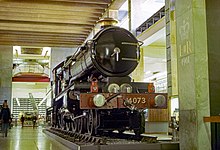Caerphilly Castle is a member of the GWR 4073 Class built in August 1923.

In service
editThe lead locomotive of its class, after a brief period of running-in service, between April and October 1924, the locomotive was exhibited at the British Empire Exhibition, which was held at Wembley Park, Wembley, north-west London.[1] Its first shed allocation was Old Oak Common. Its August 1950 shed allocation was Bath Road, Bristol. Its last shed allocation was Cardiff Canton in March 1959.
Preservation
editWithdrawn in May 1960, it was made part of the National Collection. Refurbished for display purposes at Swindon Works, on 2 June 1961 she was formally handed over by Dr Richard Beeching at Paddington Station to the director of the Science Museum. Pickfords hauled the engine from Park Royal Goods Depot to the museum in Kensington, using Scammell Constructor units on Sunday 4 June.[2][3] She was then placed on display in the new land transport gallery.
After the Science Museum decided to refurbish the gallery into the Making the Modern World,[4] it was decided to transfer the locomotive to STEAM at Swindon. After a period on display at the National Railway Museum, York, she moved to Swindon on the museum's opening.
Notes
edit- ^ le Fleming 1960, p. H16.
- ^ Pickfords 1961 ~ Scammell Junior Constructor Heavy Haulage ~ GWR 4073 Caerphilly Castle ~ BTF. YouTube. Archived from the original on 10 December 2021.
- ^ British Railways Magazine: Western Region Vol 12 No 8, page 238-9
- ^ Rooney, David. "Making the Modern World". David Rooney. Archived from the original on 3 February 2022. Retrieved 3 February 2022.
References
edit- le Fleming, H.M. (November 1960) [1953]. White, D.E. (ed.). Part 8: Modern Passenger Classes. The Locomotives of the Great Western Railway (2nd ed.). Kenilworth: RCTS. ISBN 0-901115-19-3.